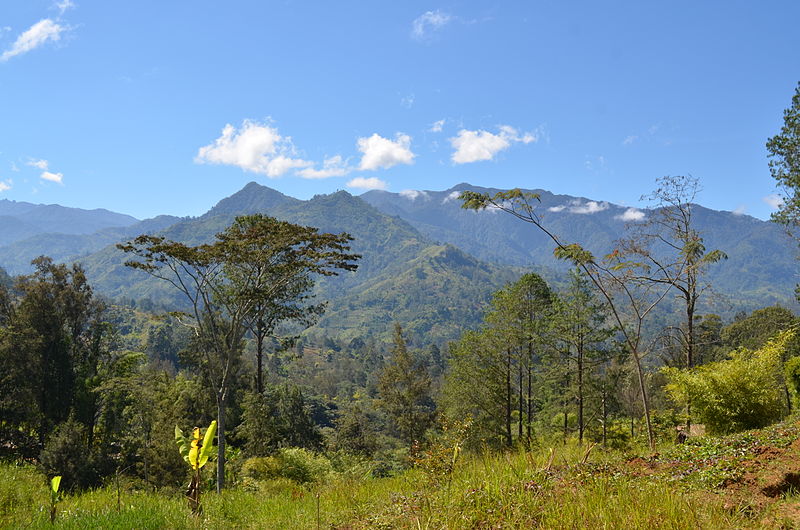Papua New Guinea Ulya
Papua New Guinea Ulya
Papua New Guinea is one of the most diverse places on the planet, boasting an unparalleled level of cultural and biological heterogeneity. The lush tropical forests that blanket this massive island are home to over 800 spoken languages, a full 12% of the world’s total, as well as countless species of plants and animals, many of which remain totally undescribed by Western science. This year is our second year offering the Papua New Guinea Ulya from the country’s Western Highlands region and we are excited to be bringing this year’s crop back to the menu!

The Highlands of Papua New Guinea (photo via Wikimedia Commons)
Coffee production in Papua New Guinea can be broken into two primary categories: estate coffees and those produced by small family farms. The first large plantations were established in the late 1920’s by the colonial powers of Germany and Great Britain. These large private holdings were a dramatic departure from the traditional subsistence farming of communally held lands by indigenous Papuans.
During the 1960’s the Papuan government invested heavily in the infrastructure of the interior, creating roads that facilitated the spread of coffee growing and its adoption into small “coffee gardens” on family farms.
These small plots of coffee heralded the introduction of market agriculture to small scale farms in Papua New Guinea. To this day coffee is the second largest cash crop on the island, representing the only source of income for many farmers living an otherwise subsistence lifestyle. In Papua New Guinea there are over 280,000 smallholder farmers growing on less than a hectare, 600 farms between 1 and 30 hectares, and only 65 large plantations.
The Ulya lot we are offering falls in an interesting middle ground between the large scale commercial operations and the coffees that are grown to supplement the income of subsistence farmers. Ulya is a large coffee plantation in the Wahgi valley, but they also offer the services of their technologically advanced wet mill to the smallholders surrounding the farm. This lot comes from these smallholders who sell their coffee to the Ulya mill, which then readies it for export.
Most coffee from small farms in Papua New Guinea is sold to one of the 6000 roadside coffee collectors, who buy the coffee from the back of a truck, and then take it to one of the country’s 51 registered mills, which then goes on to one of the 18 registered exporters. Many of the small farmers of Papua New Guinea live long distances from the nearest road, which means that the coffee often sits for days before the next buyer comes by. This can lead to problems with the consistency and quality of the coffee as it is waiting while still in the fruit, making it prone to unwanted fermentation.
Ready access to the Ulya mill has produced a lot that retains all of the wild characteristics of Papuan coffee, with an amazing clarity unlike so many of other coffees from the region. It has deep, rich herbal notes of sassafras, exotic spicy notes of cinnamon and cardamom, paired with thick buttermilk acidity and a wild cranberry sweetness. Look for this offering in our café, our online store, with finer area grocery stores, and with our wholesale partners.
